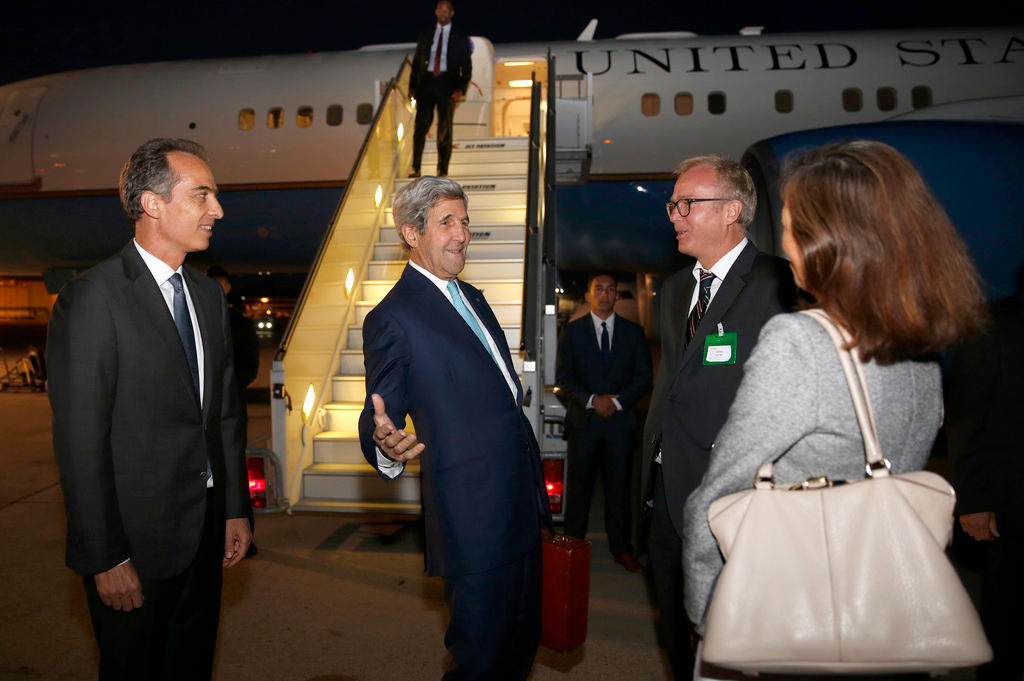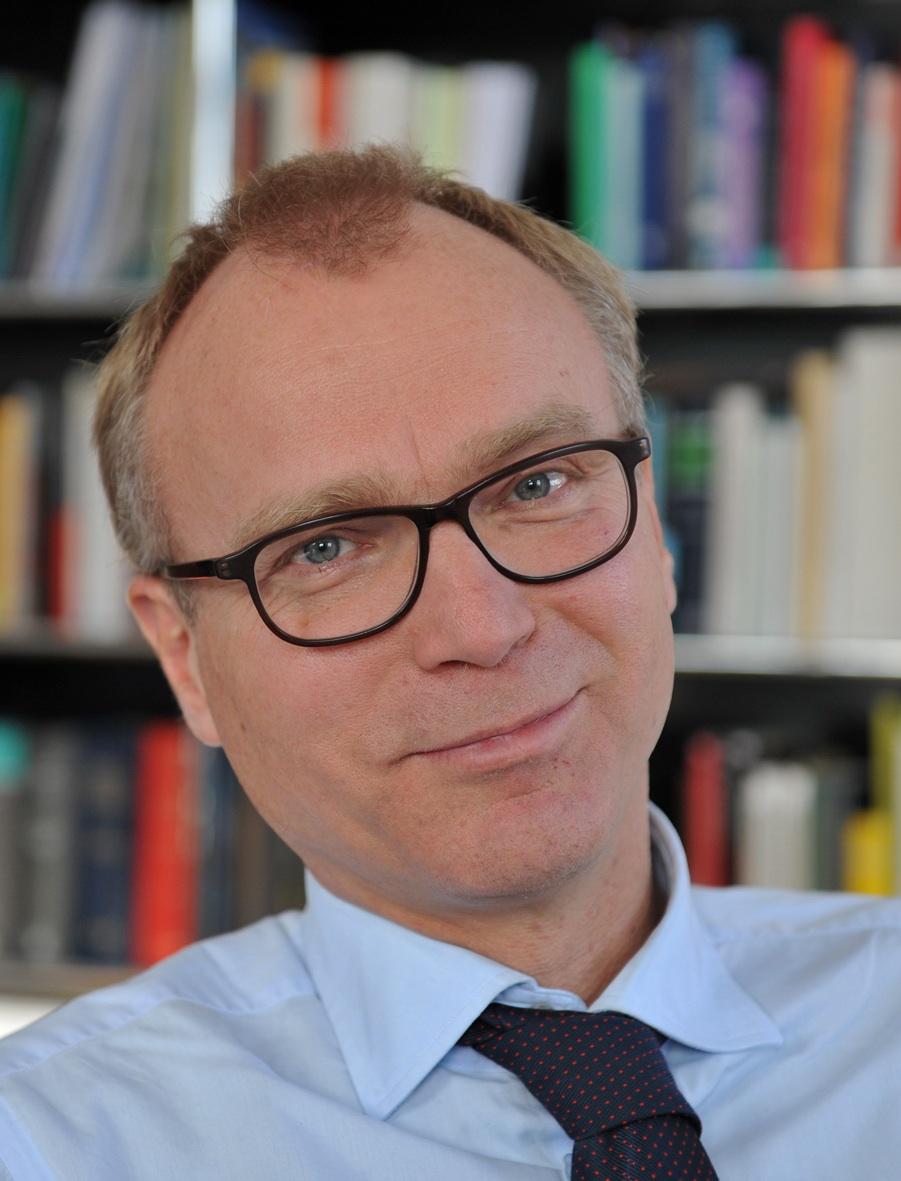
Switzerland has no ‘hidden agenda’, says new ambassador

From his sixth-floor office window Valentin Zellweger has sweeping views of his new realm – International Geneva – that stretches from the deep-blue lake northeast of the centre up towards the airport, and includes institutions like the United Nations European headquarters and the World Trade Organization.
Zellweger took over as the new Swiss ambassador to the UN and international organisations in GenevaExternal link on August 1. Although only several weeks into the new job, he agrees with his predecessor, Alexandre Fasel, that the Geneva posting is definitely ‘the best on offer’ in the Swiss foreign ministry.
“Geneva is much more important than I ever imagined. I was astonished at the huge variety and importance of the work done here,” declares the tall blond bespectacled diplomat.
It must seem a far cry from his previous post as head of the Directorate of International Law in Bern, where he was the foreign ministry’s go-to legal expert on dictator funds stashed in Switzerland.
Since arriving in Geneva, the Basel-born diplomat has been thrown into the thick of things, presiding over the Swiss ambassadors’ annual meeting at the UN, attending the Human Rights Council and hosting US Secretary of State John Kerry, who was in Geneva for marathon Syria negotiations with his Russian counterpart Sergei Lavrov.

“That’s the best way to learn,” he declares. “If you have too long to learn, it becomes very complicated.”
His routine has been altered dramatically – even his daily commute.
“I took a boat to work today – but not my own private yacht,” he jokes. “The ‘mouette’ taxi shuttle boat across the lake is a great way to commute. It only takes 15 minutes.”
Human Rights Council
As local ambassador for the host nation while also representing Switzerland on the international scene, his list of priorities can quickly resemble a phone book. But one stands out: the successful functioning of the Geneva-based UN Human Rights CouncilExternal link, which aims to protect human rights around the world. Switzerland is one of 47 countries that currently sits on the council.
But all is not well with the UN rights body. Ahead of the opening of the 33rd session in September, Ambassador Choi Kyong-lim of the Republic of Korea, the council president, touched on states’ frustrations at the unhealthy climate in the council, with reports of blockages and obstruction over situations in Yemen and Syria.
Zellweger cautioned: “I would argue that the Human Rights Council is much better than its reputation. There are major concerns but the council is a mirror of what’s happening at the moment. The world is getting more complicated and fragmented.”
The legal specialist is full of praise for the council’s Universal Periodic Review (UPR) process, a human rights peer-review mechanism between states. The second round of UPRs is due to conclude in November, followed by a period of reflection on improvements.
Valentin Zellweger was born in 1962 in Basel. He studied law at the universities of Basel and Neuchâtel, obtaining a PhD in public international law.
He joined the Swiss foreign ministry in 1991 and completed his internship at the Swiss Agency for Development and Cooperation (SDC) and Swiss diplomatic mission in Nairobi. He later worked as diplomatic officer at the Department of International Law and at the Swiss mission to the United Nations in New York.
From 2003 to 2007 he was head of the office of the first serving president of the new International Criminal Court in The Hague. In 2007 he returned to the Department of International Law in Bern and headed the Division for International Law from 2010-2016.
Since August 1, 2016, he has been the Permanent Representative of Switzerland to the United Nations and to the other international organisations in Geneva.
He is married and has two daughters.
Switzerland’s modus operandi
At the ongoing council sessionExternal link, Switzerland is backing a number of initiatives: a resolution on the links between mass atrocities and transitional justice, and another on cultural rights and the protection of cultural heritage in armed conflicts. It is also part of a “groups of friends” in the fight against violent extremism.
What is the modus operandi of a small country like Switzerland in multilateral forums like the rights council?
“We try to adapt our input to the issue at hand,” he explains. “Sometimes it’s useful to give a conceptual input. In other human rights areas it may be grassroots work and close contact with civil society or building bridges with different camps. There is no one-size-fits-all solution.”
The strengths and weaknesses of the multilateral system were debated at last month’s Swiss ambassadors’ annual conference, held for the first time at the UN in Geneva. Foreign Minister Didier Burkhalter said Switzerland ‘held a good hand of cards’ when it came to reinforcing the system, whether through dialogue and consensus, innovative ideas or its pragmatic approach of working in small groups.
Zellweger agreed: “One of Switzerland’s strengths is that we are considered an honest player. We don’t have a hidden agenda or strategic goals that involve making lots of detours. Pragmatism and realism often help us to find solutions that may bridge the gap between different positions.”
It’s all about compromise, he added: “You do things by listening to others and understanding what they are saying and in the end finding common approaches. It’s almost part of our DNA.”
Civil society, academia and business
Another major priority for the Swiss mission will be overseeing plans to renovate many of the international organisation headquarters in Geneva, such as the UN Palais des Nations. Over CHF2 billion ($2.05 billion) is being invested in new buildings and renovations, as well as local transport. A considerable chunk of the finance consists of federal and cantonal loans.
A recent editorial in the Le Temps newspaper took a swipe at Swiss officials, urging them to drop their “discreet hotel manager mentality” and to get more involved in political discussions and not be afraid to affirm their democratic values.
Zellweger sidestepped the hotel manager critique but agreed that the Swiss democratic model and values can be extremely useful for diplomats.
“Wherever you go, people know about Switzerland as a haven of peace and dialogue. The most important thing is that it gives us a great deal of credibility,” he declared.
He noted that the federal authorities and cantons have a long-term strategy to reinforce International GenevaExternal link, but agreed that more work was needed beyond new bricks and mortar.
“Today’s problems cannot be solved by governments alone. We need an inclusive approach that includes not just civil society and academia, but also business. How can you cope with health crises without addressing them with help from industry, pharmaceutical and medical? Geneva has great potential as there is a major business presence and openness to be inclusive. It’s a mind-set thing and spirit of compromise and inclusiveness that we are good at.”

In compliance with the JTI standards
More: SWI swissinfo.ch certified by the Journalism Trust Initiative


























You can find an overview of ongoing debates with our journalists here . Please join us!
If you want to start a conversation about a topic raised in this article or want to report factual errors, email us at english@swissinfo.ch.